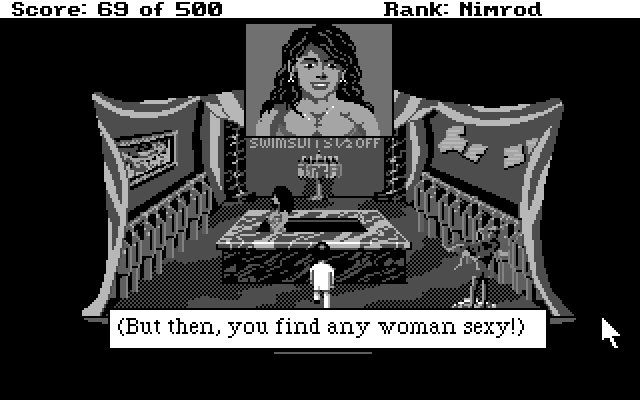Cruft, bloat and fecklessness

Back with another cock-blocking beat
PDF Version
Evolution:
a : a process of change in a certain direction : unfolding
b : the action or an instance of forming and giving something off : emission
c : a process of continuous change from a lower, simpler, or worse to a higher, more complex, or better state : growth
d : something evolved
There is an opinion being voiced in contemporary circles which alludes to the fact that the human race is 'evolving'. This ideological trope is based (in part) on a narrative which co-opts the rise of digital lifestyles in the information age. Those espousing the concept, point to modern methods of large scale governance and a drive toward digital services by organisations in all sectors. Great swathes of the population show their support for this self congratulation and enthuse to their peers about the latest method of acquiring dopamine releases from their digital devices.
Scratch the surface of this mass perception and it reveals a conspicuous lack of substance. The reality of this so called 'evolution' is less to do with "changing to a better state" and is in fact more in line with the strategies associated with major commercial campaigns.

In regards to the advancement of technological awareness among the global population, it should be recognised that yes - the vast majority of the world's population do indeed have access to internet enabled devices. These devices do (in many ways) facilitate their lives in ways that our forefathers could never even imagine. However the reason that these facets of digital life were unimaginable to the industrial and agricultural workers of the past, is because for the most part they don't represent any actual practical value. Detaching from the constant checking of social media accounts and peer based self validation reveals that in fact, life is far superior without the anxious monitoring of social media accounts for interaction - be it positive or negative.

During the gilded age of digital consumer technology (the 1980's), children in first world countries including Britain were suddenly equipped with unprecedented computing power in the form of 8-bit home micros. The journey usually adhered to a fairly predictable process; the computers were shipped with several boxed games and possibly even the odd application bundled alongside. Deals done between software publishing houses and computer retailers delivered arcade and strategy games in single price point retail packages. These bundles were conveniently advertised to take advantage of trends among the youth of the day. Due to the internet being some years away, the only networking options included comparatively expensive baud-rate modems. These early modems were connected to dial-in bulletin boards such as Micronet and Prestel. This meant that unless you lived in commercially viable urban areas and had a reasonable disposable income, obtaining new games or other software was a major barrier. Consequently the traditional adage of 'Necessity being the mother of invention' was played out across the entire market. Teenagers with no prospect of obtaining new games for weeks or months turned to coding simple animation routines and other recreation orientated programs. With computer science being taught in British secondary schools, the average bedroom coder had their raw enthusiasm augmented with industry level principles. These best practice methods were based on the engineering principles used in high level commercial applications. As a result, the simple graphics orientated routines were enhanced with more efficient coding architecture. What started as lots of GOTO loops, became structured subroutine driven programs utilising multi-dimensional arrays and assembler methods. Being a nascent market, print media jumped onto the bandwagon offering monthly magazines, often sporting 'free' magnetic media with much anticipated fresh software. Prior to the shift to 16-bit, no respectable geek was without a brace of computer magazines featuring lengthy code listings, many promising unseen features unlocked from within the mysterious graphics and sound chips alongside their single digit Mhz CPU's.

As the market and the users evolved, so did the hardware offerings from such visionary American firms such as Atari and Commodore. Their 16-bit architecture essentially marked the most significant shift in computing power available to domestic users. Said domestic users were invariably the junior members of any given household. The general attitude from parents was one of curious tolerance. This translated into a fundamental disparity between the technology savvy youth and the slightly befuddled spectator adults. The vast majority of adults were completely technologically illiterate during this time. Their exposure to computing was limited to the workplace or having a proto-geek here or there in their social circle. Only a tiny percentage of adults were employed in roles having access to personal or even network computing. This was an unprecedented shift in the power dynamic of the 1980's household. Basically the prevalent attitude toward technology among the youth was:
The 'rents don't know shit about tech, so don't even engage them with it, or they'll just feel threatened.
The reality was that many adults were not blind to the way things were 'evolving'. Consequently they sought to encourage their progeny in the pursuit of technological skills. Schools and higher educational institutes reflected this drive and curricula expanded to facilitate the push forward into what seemed a bright technocratic future.
With literally millions of aspiring software engineers being hot-housed in their own time, there was an attitude among them and their peers that literally anything was possible. Combining their digital familiarity with traditional fields of electronic engineering and product design created numerous junior entrepreneurs. One of these visionaries would be a one Mr. David Braben whom we will return to later. All in all, it was a golden age and everyone living through it expected video phones, flying cars and teleportation to be just around the corner.
Note: Commercial forces had actually been trying to push video phones on to the public since at least the 1970's. Until Hutchison 3G swamped the 21st century market with loss leading hardware on ludicrously cheap contracts, nobody was prepared to have such privacy invading devices in their house - never mind in their pocket. Today things have changed somewhat and people now voluntarily share daily images and video of everything from their lunch and their posteriors to their lunch having recently exited their posterior. Have you signed in today?

Then in the early 1990's, someone in Westminster decided that a highly technologically capable population was a bad thing. The conservative administration of prime minister John Major turned the tables on the forward reaching youth and deprioritised computer science in favour of ICT (Information and computer technology) which was basically word processing and spreadsheets. More offensively a broad euphemism for:
STOP THESE BLOODY KIDS TEACHING THEMSELVES THINGS THAT WE CAN'T UNDERSTAND
Within less than half a decade, the generations coming up the ranks had abandoned coding at home or by way of elective education. They perceived the much more highly sophisticated 16 and 32 bit computers to be forerunners to the 'no user serviceable parts' gaming consoles of the late 20th and early 21st century. In a nutshell, the Tory government smashed the wave of highly capable young technocrats on a hastily deployed promontory of utility based usage. From the early 90's onwards, young people were encouraged to look as deeply into the working of their computers as they would the internal workings of their household washing machine.
The motivation behind this overtly repressive move is not clearly documented. Educational boards had their technology budgets reduced, schools were compelled to force ICT as a mandatory subject and to reduce the number of computer science students. The incredible pace of the 80's learning curve was suddenly subverted and consequently the future of this once highly innovative island was irrevocably altered - for the worse. Bearing in mind that the entire wave of innovation had been deployed under possibly the most vicious Tory who ever lived - Margaret (the milk snatcher) Thatcher . Clearly this polar reversal in attitude toward technology was not as a result of a change in administration. John Major was possibly one of the least effective prime ministers that Britain ever produced - Tory or otherwise. The only real accomplishment he could ever claim was secretly screwing Edwina Curry behind their partners (and the nations) back. Given that Edwina was hardly what anyone could describe as a major sex symbol, or even an attractive personality, this bold display of infidelity really only represents an achievement in terms of clandestine domestic skullduggery.

So what we see is that some other force came to bear on the burgeoning technical glitterati of The United Kingdom. Given the subsequent moves played out by successive governments toward offshore tendering and globalism, it could be argued that this was a deliberate move by a non governmental, supra-national body to influence the global mindset. Enough with the innovation and instead nudge them into not caring about excellence and leaving it all up to someone else who lives far away and can do it much cheaper. As technology advanced through the PC and mobile computing revolution, the emphasis on recreational and services based application only increased. Today we live in an age where toddlers try to pinch scale the images in magazines and react badly when nothing happens.

Perhaps the only significant moves to challenge this relentless slide into mediocrity comes in the form of a handful of innovative and altruistic champions. Nicholas Negroponte and the 'One Laptop per Child' movement represented a truly brilliant solution to technical illiteracy in the third world. An idea of such immeasurable merit that it was of course broadly marginalised. No doubt by the intangible and unaccountable forces mentioned previously. Another major opponent to this grotesque dumbing down of the technically literate generations would be the inventor of the 80's barnstormer, vector based, space trading game 'Elite'. A one Mr David Braben, the CEO of software house Frontier Developments.

The concept of a 64bit computer made so cheaply that it could essentially be given away free with boxes of breakfast cereal, was supposed to empower a new generation of coders. A significant number of code clubs were hastily organised on the back of the mass manufacturing of £10 - £40 Raspberry Pi's. For a brief moment it seemed as if the toxic tide of lethargic, laissez-faire technical attitude may yet be turned. Unfortunately, as much a visionary as Mr Braben is, he faced a truly invincible opponent. An opponent which had pwned him for decades - video games.
Trying to motivate media saturated young gamers to put the console controller or tablet down and connect ribbon cables to IO ports is a major undertaking. Consequently the only people who really got enthusiastic about the Raspberry Pi were the exact same people who owned 8-bit micros in the 20th century. The largest market for Raspberry Pi's rapidly became men in the 35-50 age group dabbling in robotics or the emergent 'IoT' world. Admittedly many of them did leverage their purchases by way of educational involvement with the new generations. But for the most part Raspberry Pi's are now perceived as a hobby based device for robotics nerds, wild haired boffins and potting shed tinkerers.
This historical dive into the gilded age of British computing is intended to serve as a reminder to anyone thinking of jumping on the "aren't we all just bloody great now" bandwagon. Look at the evidence of malevolent influence in the past and you will see that some were most certainly aware that the human race was evolving and they did their level best to prevent it.
But of course, that was in the bad old days and things are much better now ... aren't they?
